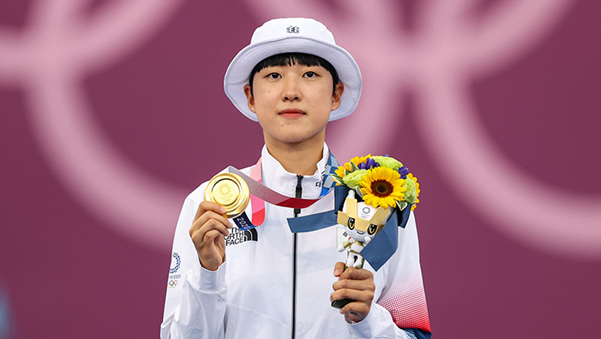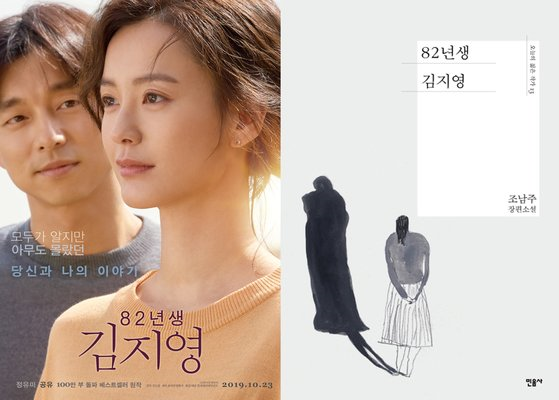After a very short ‘truce’, the gender conflict between women and men arose once again during the 2020 Tokyo Olympics. In the past, webtoons, commercial advertisements, and policies were censored and criticized for different gender related reasons. This time, a female member of the Korean national archery team, An San, who won three gold medals at this year’s Olympics was at the center of the controversy. Though she brought glory to Korea, being the first triple gold medalist of the Tokyo Olympics, and the first archer ever to win three titles at a single Olympic games, she came under fire from critics for being a suspected feminist. Following the posting of an article that claimed 99 percent of females in their 20s with short hair that attend women’s universities are feminists to a male online community, people started to believe it. An San, who sports a short haircut was considered to a ‘feminist who hates men and who thinks women are superior to men’, based on the school she attends, her age, and her favorite pop singer.
An San also was accused of using male-bashing expressions on her SNS in the past. As a result, some men demanded she be deprived of her gold medals until she apologized for her actions. This controversy intensified the conflict between feminists and anti-feminists. Public opinion was divided with some criticizing the personal attacks against An San, while others labelling feminism as ‘absolutely evil’ and feminist incitement'.
 |
| ▲ Ansan, who won three gold medals from 2020 Tokyo Olympics, has been the center of the gender conflict. (Photo from SBS News) |
The controversy caught the interest of foreign and domestic media. International media labelled it as online abuse. Reuters reported the criticism of An San was a result of a growing anti-feminist sentiment among young men in Korea. The BBC also reported on this controversy. BBC Korea’s correspondent, Laura Bicker, posted strong criticism regarding this controversy on her SNS, saying “This has nothing to do with a haircut. This is a vocal minority attacking women they believe do not conform to their ideals. If South Korea is to tackle gender equality and also deal with its record low birth rates, then it will have to deal with this issue head on.”
Antipathy towards feminists is nothing new. A lot of the problems stems from a basic misunderstanding of the definition of feminism and what is means to be a feminist. According to the Oxford Dictionary, feminism is the belief and aim that women should have the same rights and opportunities as men. This also includes the struggle to achieve this aim. So basically, feminism itself is not a drastic thought or conspiracy at all. Feminism has had a long rich history around the world. However, Korean women are still being asked whether they are feminists every day. If they say yes, they open themselves up to being treated as a social pariah. Therefore, some analysts say that the abuse directed towards An San is nothing unique or unusual, but rather the expansion of an everyday phenomenon from the level of general public to that of a media figure.
Something as simple a question that seeks an opinion about specific events or situations can result in the labeling of the respondent as a feminists and they could be censored. The Korean movie ‘Kim Ji-Young, Born in 1982’ is a representative example of this case. Online communities hosted posts where people complained about being uncomfortable when were asked whether they saw the movie. If they said yes, they were categorized as rebellious. Last April, controversy erupted over an educational video made by Korean Institute for Gender Equality Promotion and Education. An anonymous online user in one community said that her boss called and interrogated her directly about her thoughts about the video making her feel more uncomfortable.
 |
| ▲ Some women entertainers were blamed for reading and supporting ‘Kim Ji-Young, born in 1982’. (Photo from Joongangilbo) |
Even in schools where students must learn gender equality, the situation is getting worse. The Korean Teachers and Educational Workers’ Union (KTU) said as a result of the class, teachers are reporting being queried by their students on their support for feminism or how they feel about the Ministry of Gender Equality and Family. Son Ji-eun, who is the female vice-chairperson of the KTU, pointed out that only female teachers were being asked to confirm their ideology on the matter, while male teachers hardly ever get asked those kinds of questions.
The interrogation of women about their beliefs is clear gender related violence because of the inherent misunderstanding on feminism. Experts point out that what the Korean media indiscriminately labels as a mere controversy blurs the nature of online bullying, while passing the blame on to the victim. Labelling these matters as feminist controversies gives the false impression that feminism itself is the problem. In the past, several female entertainers have been attacked by the men-outnumbering-women community. This could be for anything from simply saying they read Kim Ji-young, Born in 1982, or because they wore a T-shirt with "Girls Can Do Anything" written on it. In response, local media assigned blame for the attacks on the female entertainers rather than pointing out the problem of online violence. The essence of the incident was clouded by a debate over their actions instead of the actions of the online bullies, forcing the victims to stand alone in the center of the controversy. This tragic situation is forever being repeated as the perception that ‘feminists cause trouble’ spreads throughout the general public. Some people mistake feminism for female chauvinism or misandry. They don’t understand the definition of feminism itself and mistake it for a taboo subject. This is likely due to the flood of misinformation easily accessible online. It is especially vulnerable to generations in the teens and 20s who indiscriminately absorb the unverified information. On the Blue House website, a petition has been filed demanding that elementary, middle, and high school feminist education become compulsory. The petition was approved by more than 213,000 people and warranted an official response from the Blue House. There is research to prove feminist education benefits societies. A recent paper reported that feminist education is needed to correct the problems of sexism and misogyny that are deeply embedded in Korean society. According to the paper, anti-feminist feelings are based on a misunderstanding feminism and the sexual objectification of women. These sentiments can be found in schools, proving there is a need for appropriate responses including more education on the subject. Feminist education actively raises questions about sexist and hateful factors towards women and makes people realize that the contributions of women to society are taken for granted.
The controversy surrounding the treatment of An San has forced Koreans to once again take a hard look at how feminists are viewed and treated by Korea society. Many women just like her are already fighting the threat of being labeled a feminist by a society that treats them as social pariahs. They are being interrogated about their ideologies at school and in the workplace. With no proper education on the issue from the leaders in our society, we can only wonder when the next An San will appear. We could create a better society, without gender controversies, by offering education that helps people have a better understanding of gender equality and feminism, eliminating our misperceptions of feminists. It is also necessary for people to not make judgements regarding a person’s personal beliefs or ideologies based on their appearances alone. Taking these small actions will help us build a society that future generations can be proud of.
오유준, 김주예, 김서연, 구시현 dankookherald@gmail.com

![[Campus Magnifier] Let's Surf the Library!](/news/photo/202404/12496_1765_4143.jpg) [Campus Magnifier] Let's Surf the Library!
[Campus Magnifier] Let's Surf the Library!
![[Campus Magnifier] Let's Surf the Library!](/news/thumbnail/202404/12496_1765_4143_v150.jpg)





